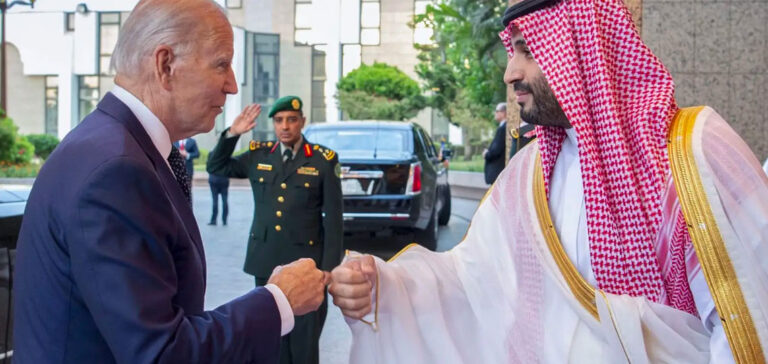He first wanted to make Saudi Arabia a “pariah”, then attempted a rapprochement in July… Joe Biden, scalded by Riyadh’s decisions on oil, clearly raised his tone on Tuesday against the kingdom.
“There will be consequences for what they have done, with Russia,” the U.S. president threatened Tuesday in an interview with CNN, without specifying what kind of consequences they would be.
He was referring to the recent decision by Opec+, the oil cartel led by Riyadh, to slash its production quotas, which could send prices soaring – and thus lining the coffers of Russia, which relies on
its hydrocarbon sales to finance the war in Ukraine.
“In light of recent events and Opec+ decisions, the president believes we should re-evaluate the bilateral relationship with Saudi Arabia,” said John Kirby, spokesman for the Council of
White House national security, to the press. Joe Biden “is willing to work with Congress to think about what that relationship should be,” the adviser also assured.
Camouflet
Opec+, the thirteen members of the Organization of the Petroleum Exporting Countries (Opec) led by Saudi Arabia and their ten partners led by Russia–has inflicted a diplomatic slap in the face on Joe Biden, who instead called for ample supply.
The U.S. president had traveled to Saudi Arabia in July to meet with Crown Prince Mohammed bin Salmane, yet had vowed during his campaign to make the kingdom a “pariah” following the murder of Saudi journalist Jamal Khashoggi.
The Saudi Foreign Minister Faiçal ben Farhane explained on Tuesday on the Al-Arabiya channel that the production cut represented a “purely economic step taken unanimously by the member countries” of the organization, aiming to “maintain a sustainable oil market”.
“Opec+ members acted responsibly and made the appropriate decision,” he said.
The oil cartel’s decision has sparked a wave of indignation among members of the U.S. Congress, and in particular among members of Joe Biden’s Democratic Party.
The powerful head of the Senate Foreign Relations Committee Bob Menendez threatened Monday to block any future arms sales to Saudi Arabia. Democratic Senator Richard Blumenthal and House Representative Ro Khanna took him at his word by introducing legislation on Tuesday to stop these exports.
Arms sales
The partnership between the United States and Saudi Arabia was sealed after the end of the Second World War, providing the kingdom with military protection in exchange for American access to oil. This crisis-ridden relationship was revived by former Republican President Donald Trump, with pharaonic arms sales at stake.
According to the Stockholm International Peace Research Institute, between 2016 and 2020, Saudi Arabia weighed in at 24% of total U.S. arms exports. The relationship is “strategic” and has “advanced security and stability in the Middle East,” the Saudi embassy in Washington said in a statement Tuesday. Bilateral military cooperation “serves the interests of both countries,” she added. Saudi Arabia has led a military coalition in Yemen since 2015 to fight the Houthi rebels, supported by its regional enemy, Iran. It was targeted by Houthi missile fire.
Joe Biden, aware of the fury of human rights activists, had justified his trip to Saudi Arabia by the concern for energy security but also for regional security. But the image of a familiar fist-to-fist greeting exchanged with Mohammed bin Salmane has yet to be turned on Joe Biden. Since the Opec decision, the American press has been full of assassinating editorials on the failure of its “fist-bump diplomacy”.





















